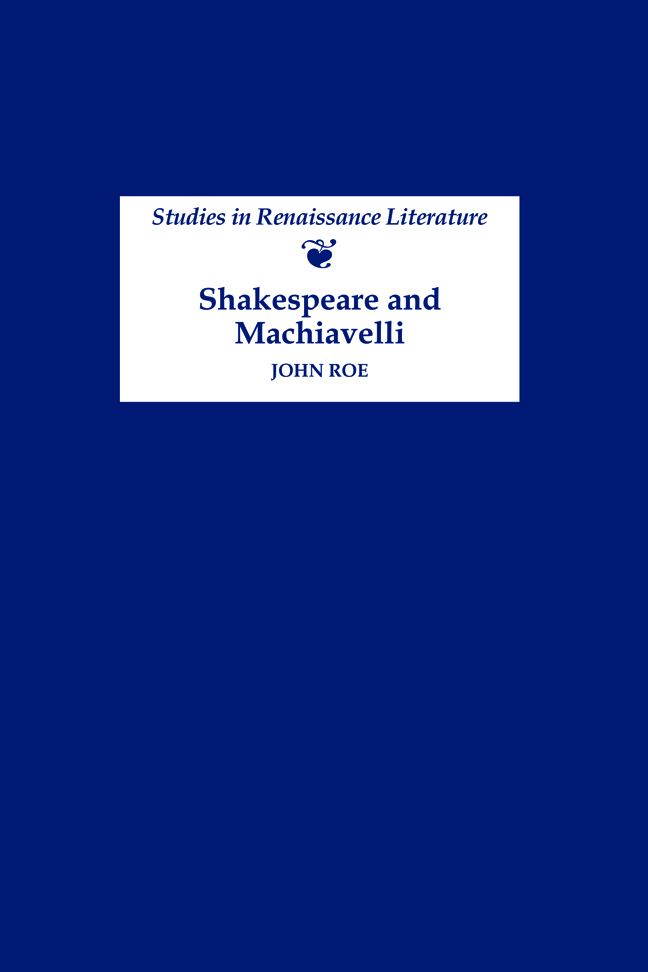Book contents
- Frontmatter
- Contents
- Acknowledgments
- Text and Abbreviations
- Preface
- Dedication
- 1 Shakespeare and Machiavelli
- 2 Richard II and the Bullingbrook Affair: Subtle Rhetoric and a ‘Silent King'
- 3 Henry V: The Prince and Cruelty
- 4 King John: Cruelty and the Action of Conscience
- 5 Julius Caesar: Conscience and Conspiracy
- 6 Antony and Cleopatra: Magnanimity and a Machiavellian Erotics
- Bibliography
- Index
4 - King John: Cruelty and the Action of Conscience
Published online by Cambridge University Press: 15 February 2024
- Frontmatter
- Contents
- Acknowledgments
- Text and Abbreviations
- Preface
- Dedication
- 1 Shakespeare and Machiavelli
- 2 Richard II and the Bullingbrook Affair: Subtle Rhetoric and a ‘Silent King'
- 3 Henry V: The Prince and Cruelty
- 4 King John: Cruelty and the Action of Conscience
- 5 Julius Caesar: Conscience and Conspiracy
- 6 Antony and Cleopatra: Magnanimity and a Machiavellian Erotics
- Bibliography
- Index
Summary
Perché lo universale degli uomini si pascono così di quel che pare come di quello che è: anzi molte volte si muovono più per le cose che paiono che per quelle che sono.
(Discorsi, I, xxv, B 151; ‘For the generality of men feed themselves as much on what seems to be as onwhat is; still more, many times they are moved more by the things that seem than by the things that are', G 252.)
KING JOHN has been described appropriately as a transitional or ‘interstitial’ play, standing as it does between two tetralogies. It may be regarded as among the most Machiavellian of Shakespeare's histories, simply because it contains several characters who at various points express themselves in familiar Machiavellian terms: the king himself, both Philip and Lewis of France, Pandulph, the Papal emissary, Queen Eleanor, and of course Philip Falconbridge, otherwise known as the Bastard. But it is Machiavellian for other reasons than this. King John, like all the histories, is a play which locates the problem of conscience within the element of action and continu- ing change. We see this happening particularly as the initiative switches from one character to another, testing each of them in turn. We see it at the opening of the play when the kings of England and France pledge a trust to each other before the gates of the disputed city of Angiers. Even the city has a Machiavellian role to play insofar as it must consider what strategy to adopt when beset by two powerful, conflicting princes. We see it again when first Philip, and then John, finds he is gaining an advantage that necessarily involves a breach of faith. Such situations are familiar enough to the student of Il Principe. On the one hand this sacrifice of conscience and trust produces an instant denunciation, nowhere more roundly or vehemently expressed than in the Bastard's scathing analysis of the principles of Commodity which ends Act Two. On the other hand, by its constant change of focus and sympathy the play seems to meditate on the fragmented and fragmenting relationship of conscience and power rather than merely condemning it.
- Type
- Chapter
- Information
- Shakespeare and Machiavelli , pp. 94 - 132Publisher: Boydell & BrewerPrint publication year: 2002



